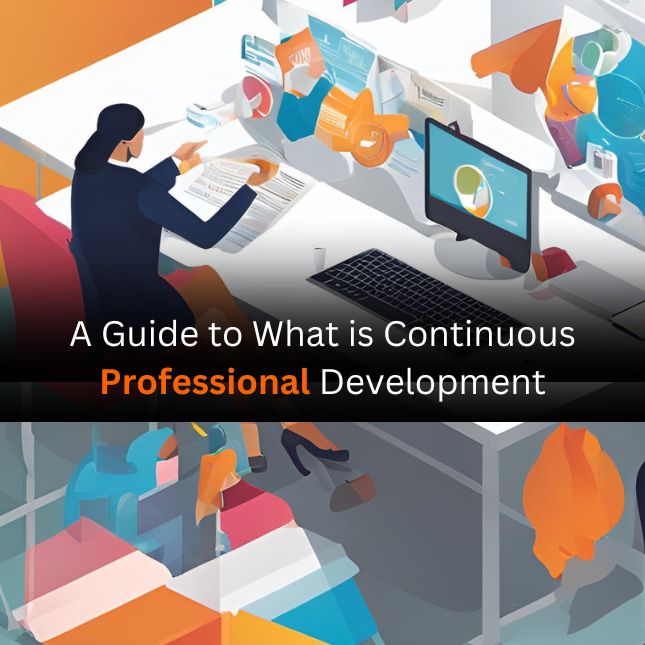OVERVIEW:
Continuous Professional Development (CPD) is quite helpful and essential for ACCA professionals to thrive in their careers. CPD helps them stay updated with the changing trends, standards, and regulations of accounting and finance so that they can meet the evolving demands of the profession. CPD adds value to an individual’s professional reputation. To know more about Continuous Professional Development (CPD) read the complete blog.
WHAT IS CPD IN ACCA?
Continuous Professional Development (CPD) is a very essential part of ACCA qualification and profession. CPD isn’t limited to the academic part only but is also encouraged and necessary for ACCA professionals in the practical world of accounting and finance. Continuous Professional Development (CPD) helps ACCA professionals stay updated with any changes in industry trends, standards, and regulations of accounting. This continuous learning helps the professionals maintain their skills, update their knowledge, and be productive and innovative to meet the updated demands and standards of the industry. CPD also helps the professionals to provide high-quality services, meeting all the industry criteria to clients or employers.
WHY IS CPD IMPORTANT FOR ACCA MEMBERS?
There are numerous reasons why Continuous Professional Development (CPD) is considered so important for ACCA members, some of which are listed below:
- The main reason is that CPD helps members stay current with any regulatory changes, updated standards, and industry trends in the accounting or financial sector. This provides professional competence to the ACCA members.
- Another important reason is ensuring compliance with ACCA regulations. It is obligated for an ACCA member to meet CPD requirements to continue the membership.
- Continuous Professional development (CPD) also enables the professionals to get senior professional roles, opens various career opportunities, and higher earning potential by providing necessary updated skills and knowledge.
- With time the Accounting and Finance sector is becoming more challenging as the regulatory changes are ever-evolving, CPD allows the professionals to stay updated with these changes, adapt them, and overcome the challenges effectively.
- It also earns professional credibility with employers and clients.
CPD REQUIREMENTS FOR ACCA MEMBERS:
ACCA members are required to complete certain Continuous professional development (CPD) hours annually to maintain their membership. CPD requirements are quite flexible, allowing individuals to choose amongst CPD activities which suits their role best and benefit them in nurturing their professional skills as well.
CPD Hours Requirements:
ACCA members need to complete 40 CPD units, annually. These units include both formal and informal learning activities. Out of these 40 hours, an individual must complete 21 hours of structured learning activities, in which the development activities have a measurable learning outcome such as online training sessions, seminars or courses, etc. Along with that, the remaining 19 hours could be for unstructured learning for example: professional learning, self-study, etc.
CPD Reporting:
ACCA members must keep track of their CPD activities with evidence of the completed activities. They need to update about their Continuous Professional Development (CPD) activities along with evidence on the website of ACCA’s global. Another major factor ACCA members should keep in mind while completing CPD activities is that the activities they choose should be relevant to their professional role and align with their career goals.
Exemptions and Extensions:
ACCA members may apply for exemptions from CPD in very exceptional circumstances of serious illness, etc. Apart from exemptions, newly qualified ACCA members are given a grace period of the first year after qualification after which Continuous Professional Development (CPD) requirements become mandatory.
TYPES OF CPD ACTIVITIES FOR ACCA MEMBERS:
As mentioned before, there are two types of CPD activities one is structured learning and the other one is Unstructured learning. Both of these activities are explained in-depth below:
Structured CPD:
These activities are very formal, organized activities of development and learning with defined or measurable outcomes. Examples of Structured CPD activities are:
- Enrolling yourself in training courses (online or in-person), which provide detailed guidance about topics like; tax regulations, IFRS, audit standards, etc.
- Taking part in workshops or seminars which teach the practical application of changes in legislation, accounting concepts, etc.
- Registering for an additional qualification in a relevant field (master in accounting or finance)
- Taking part in industry conferences, helps them stay updated with evolving challenges, opportunities, and trends of the industry.
Unstructured CPD:
On the contrary to structure CPD, Unstructured Continuous professional development (CPD) doesn’t have any predetermined outcomes but still contributes to professional development and learning. The examples of unstructured CPD activities are as below:
- Read industry publications, academic journals, and reports about financial regulations, industry trends, etc.
- Gain skills and knowledge from your real-life work experience by taking over new responsibilities or tasks that require learning or problem-solving.
- Network with peers, mentors, or colleagues through discussions, professional associations, etc.
HOW TO PLAN YOUR CPD AS AN ACCA MEMBER:
It is better to have a plan or structure for CPD activities so that you can align them with your goals. Here are some tips on the matter:
- First, Assess and analyze your learning needs.
- Set SMART goals for Continuous Professional development (CPD).
- Choose relevant CPD activities aligning with your goals.
- Keep an eye on your CPD progress.
- Lastly, reflect on what have you learned yet.
CPD AND THE FUTURE OF ACCA MEMBERS:
With so much diversity in the accounting and finance field, the future role of CPD is expected to evolve as well. Future developments in Continuous Professional Development (CPD) for ACCA members may include more focus on Technology, Increased demand for soft skills, Flexible learning formats, etc.
CONCLUSION:
Continuous Professional Development (CPD) plays a very vital role in maintaining ACCA membership. CPD helps Professionals to stay updated with any changes made in industry trends, accounting standards, or regulations. It helps ACCA members to evolve their skills and knowledge with industry changes and enables them to meet the demands of clients and employers. CPD helps them to achieve senior roles and positions, offers progressive careers, and makes them highly demanded in the job market.






